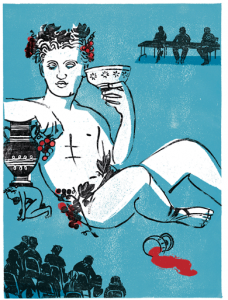
A group of Syrians arrives on Lesvos after sailing on an inflatable raft from Turkey. Photograph by Andrew McConnell for the New Yorker.
As we will discuss in class, I think we would be hard-pressed to define the generic (genre) characteristics of blogging across the web (or, even across a single platform like Huffington Post). However, the kind of scholarly blogging that we hope for you to accomplish this year in HumCore will be:
- topical (both to course topics and current events related to war)
- written in the first person and in a less formal voice than traditional expository essays
- research-based and supported by verifiable evidence
- relatively short form (a place for speculation and experimentation that builds toward longer writing projects)
- engaged in the project of hypertextuality (that is, taking advantage of the ease and flexibility of textual connections afforded by the internet)
- multimodal (embedding images, video, informational graphics, sound, hyperlinks to academic and journalistic sources, etc.)
- conducive to interaction (posing questions to readers that provoke comments, discussion, and writing elsewhere on the web)
- possibly self-reflexive about the writing and research process
- possibly engaged in urgent questions of social importance
As you begin to set up your website and craft your first blog post, you should carefully at the links to the web-only blogs hosted by general editorial magazines that are listed on the Writing and Design Process Guidelines for this assignment, including those hosted by The Atlantic, The New Yorker, Harper’s, The Economist, The Paris Review, and National Public Radio. Not only does this content model what topical, research-based, opinion-driven, short-form blogging can look like on its best day, these blogs also often treat war-related topics in unexpected ways.
For instance, Nicholas Niarchos’s September 15th post on The New Yorker details the conditions that Syrian refugees face when they arrive on the Greek island of Lesvos after fleeing from the devastation of the Syrian Civil War. This is great, urgently-cast journalism written on the ground in blog format. Another piece on the Syrian crisis, Ross Andersen’s piece in The Atlantic (posted September 23) explains how one of the world’s most important seed banks has been relocated from the war-torn city of Aleppo. Not only does this post vividly describe the catastrophic conditions that Syrian scientists and their work currently face, but also explains the importance of seed banks in the face of global environmental crises. It’s a totally different take on the Syrian Civil War than you might find on the front page of the newspaper, and one that might be fascinating to students trying to write about the intersections between the study of science and the human activity of war.
Finally, reading blogs can often provide links to fascinating material elsewhere on the web. A recent post on The Paris Review‘s blog of staff reading picks led me to this amazing article in Harper’s about the work of Bryan Doerries, a theatre director and art therapist who uses the work of the classic Greek tragedians to help US service members deal with war trauma and PTSD. In a variety of contexts this year, you will learn about the instructional or healing potentials of art, as well as the way that classic works might be refashioned to suit the political and psychological needs of a new era. Doerries’ Theatre of War project brings many of these themes together, but I would have never have known about him were it not for a short notice in a blog.
I’m not saying that you need to read or follow all of these sources. But they are great models for what we hope you will do in HumCore this year that can provide lots of thematic fodder as you begin to shape your own blogging ethos and focus.

